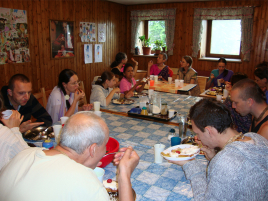European Women’s Seminar Nurtures and Inspires
By Madhava Smullen | Июл 31, 2010

Twenty-six devotee women from the Czech Republic attended a seminar entitled “Nurturing the Devotee Within You to Serve the Devotees Around You” from July 3rd to 9th this year, in the tranquil setting of Germany’s Simhachalam farm.
The 7-day event was led by Divyambara Dasi, who has organized thirty japa retreats across Europe and the US, and Rukmini Dasi, a Prabhupada disciple and devotee for 42 years, both of whom regularly teach classes at New York’s Bhakti Center.
“Four years ago, Prahlad-Nrsimha Dasa from the Czech Republic began organizing a summer camp for devotee children—but he thought, ‘why should their mothers be bored while the children are having a good time?’” Rukmini explains. “So he decided to finance a program that would educate and inspire the mothers, too. Divyambara led the first seminar in 2009 on her own, and this year, she invited me to join her.”
The seven-day retreat utilized a gardening theme throughout. On Day 1—“Trusting and Being Trustworthy”—facilitators talked about how one must trust that one’s seed of devotion will bear fruit.
On Day 2, “Poison to Nectar: Disarming Toxic Gossip,” they explained how the pesticides of toxic gossip can poison the garden of our soul. The group discussed the harm of criticizing someone behind their back, and were given tools for transforming hurtful language into nourishing words, including Islam’s three questions to consider before speaking: Is it true? Is it necessary? And is it kind?
“We also cited Krishna conscious discussion and genuine appreciation as cures for toxic gossip,” says Rukmini. “And we had everyone approach each person in the room and say something specific that they genuinely appreciated about that person. This was an extremely powerful exercise, and very moving for those who didn’t have such a good sense of self.”
Day 3, “Attitudes of Gratitude,” looked at how the seeds of spiritual love are contained within gratitude. Facilitators also quoted one of the most famous devotee women, Queen Kunti, who states in the Mahabharata that a person’s caliber is measured by how grateful they are.
On Day 4, entitled “A Cry for Help, A Gift of Love: Recognizing the Unspoken in Human Relationships,” attendees learned empathic listening skills, and the importance of hearing deeply.
The next day, “The Elephant in the Living Room: Addressing Issues of Sex and Intimacy,” focused on how a married couple should honor each other and encourage each other to come to the high standard set by Srila Prabhupada regarding devotional married life, rather than discouraging each other for not having reached it yet.
On Day 6, “A Mother’s Labor of Love: Planting Seeds of Bhakti in the Next Generation,” the group discussed the importance of raising children and having a broad “tree-top” vision, rather than myopic tunnel vision.
“To show the importance of this kind of vision, we brought a 3-inch tall baby oak tree in from the garden and explained that one day when we are all gone from this world, its power and beauty will be towering over Simhachalam,” Rukmini says. “We also talked about how each child is its own different plant, and how as parents and teachers, we need to honor and respect their growth and differences.”
On the last day, dubbed “The Essence of All Advice,” the facilitators discussed general principles applicable to life from Rupa Goswami’s Nectar of Instruction, including the concept of gradual advancement. “We must have the patience and vision to know that we’re gradually becoming a devotee, and gradually helping others,” says Rukmini.
After a one-day break, the seminar was followed by a five-day japa retreat for both women and men. Focused on the meditative chanting of Krishna’s names on beads, it was was attended by both younger and older devotees from Germany, Czech, and Russia, as well as newcomers.
“One couple who visited Simhachalam while road-tripping just decided to join the retreat, and ended up chanting 64 rounds,” says Rukmini. “So did a young man who was new to Krishna consciousness and claimed to have a very hard time chanting even four rounds a day. Both had very deep experiences.”
Ultimately, Rukmini feels that the two-week program was a great success and a very important step in ISKCON’s development.
“We have a history in ISKCON in which the women have not been appreciated, although many were the backbones of the temples and outreach, and contributed so much,” she explains. “What’s more, when the women’s voices are silenced or unheard, this also silences the voices of the children and can lead to child abuse. So this was very validating for the women and for the future generation.”
The seminar also stood out because it addressed practical issues that women were dealing with in their own lives, and not just high philosophy.
“It was a very moving and powerful experience for them,” Rukmini says. “A lot of deep appreciation was shown all around.”















